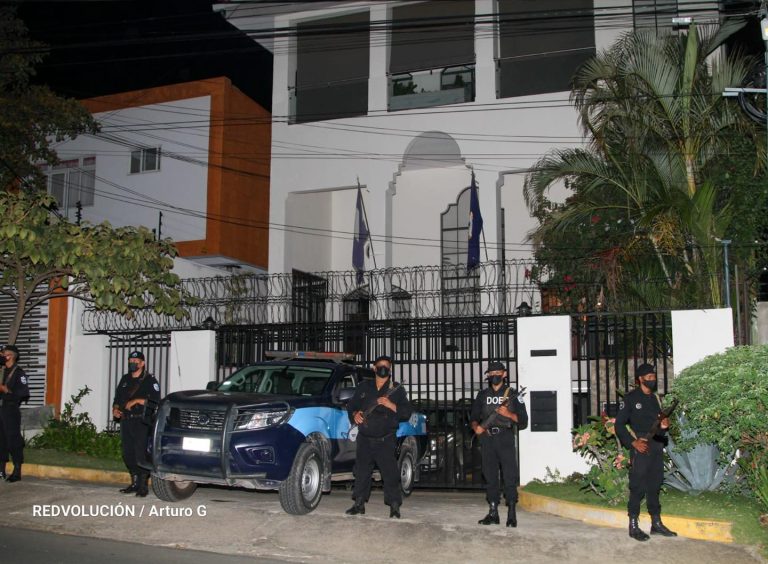25 de abril 2022

Children of Exile: The Births “Sowing Hope” in the Camp of Nicaraguan Farmers

PUBLICIDAD 1M
PUBLICIDAD 4D
PUBLICIDAD 5D
In a press conference loaded with insults towards the OAS, Foreign Minister announces that they will withdraw the credentials of its representatives

The regime of Daniel Ortega and Rosario Murillo announced this Sunday, April 24, that it had closed the office in Nicaragua of the Organization of American States (OAS), an organization from which the dictatorship resigned on November 19, 2021.
In a press conference loaded with insults towards the OAS, Nicaraguan Foreign Minister Denis Moncada also reported that Nicaragua will abandon all OAS mechanisms, as well as withdraw the credentials of all its representatives before the regional organization.
“Nor will this infamous body, consequently, have offices in our country. Its local headquarters are now closed,” the foreign minister said.
According to the OAS website, the agency’s office is in “Sierritas de Santo Domingo”, in Managua. “Currently there is no representative assigned to the office of the General Secretariat in Nicaragua,” the agency says.
Minutes after the announcement, the National Police surrounded the OAS offices, and dismantled its symbols, according to the EFE news agency.
The Ortega regime announced its departure from the regional organization due to alleged and “constant interventionist attitudes” of the OAS. However, the withdrawal will not be official and effective until November 2023, since the process lasts two years. During that period, the Government must fulfill all its political and financial obligations with the organization.
“We feel liberated from the repeated insolence of the (OAS) employees of the Yankee State Department, who represent servility, servitude, and the decrepitude and decadence of a lackluster institution reduced to being lackeys of the Yankee,” read Moncada.
“Nicaragua is not a colony of anyone; therefore, it is not part of a ministry of colonies,” said Moncada referring to the Ortega government’s withdrawing last year “in absolute dignity” from the OAS.
“By confirming our irrevocable denunciation and resignation, in the face of this calamitous, truculent and lying dependency of the State Department of Yankee imperialism, we also communicate that as of this date we cease to be part of all the deceitful mechanisms of this monstrosity, including the Permanent Council, commissions, meetings, and the Summit of the Americas,” said the Nicaraguan diplomat.
“We withdraw —he continued— the credentials of our representatives, comrades Orlando Tardencilla, Ivan Lara and Michael Campbell. We will not have a presence in any of the instances of that diabolical” organization.
Tardencilla and Lara were appointed, at the end of March, as ambassador and alternate representative to the OAS, respectively. Campbell served as Alternate Permanent Representative since October 2021.
Ortega and Murillo shuffled their representatives in the OAS in March, after the former Nicaraguan ambassador to the organization, Arturo McFields, rebelled against the regime and described the Government as a cruel “dictatorship”, during a session of the Permanent Council of that body, in an unprecedented event.
Since the OAS General Assembly of Foreign Ministers, on November 12, 2021, Nicaragua has been subjected to a “collective evaluation” process of its sociopolitical crisis, established in Article 20 of the Inter-American Democratic Charter.
As part of this process, the OAS Secretary General, Luis Almagro, sought authorization from the Nicaraguan government to allow the arrival of a high-level delegation from the regional body to negotiate the holding of new elections, with transparency and credible observation. However, the regime never provided a formal response to his requests.
The collective appreciation followed a resolution on “The situation in Nicaragua”, in which the OAS declared —with 25 votes in favor, one against, seven abstentions— that the Nicaraguan elections of last November “were not free, fair or transparent and do not have democratic legitimacy.”
In these elections, Ortega re-elected himself for a fourth consecutive term, second with his wife Murillo as vice president. However, on this occasion the Sandinista leader presented himself without political competition, after imprisoning the main opposition candidates, and without democratic guarantees.
This article was originally published in Spanish in Confidencial and translated by Havana Times
Archivado como:
PUBLICIDAD 3M
Confidencial es un diario digital nicaragüense, de formato multimedia, fundado por Carlos F. Chamorro en junio de 1996. Inició como un semanario impreso y hoy es un medio de referencia regional con información, análisis, entrevistas, perfiles, reportajes e investigaciones sobre Nicaragua, informando desde el exilio por la persecución política de la dictadura de Daniel Ortega y Rosario Murillo.
PUBLICIDAD 3D